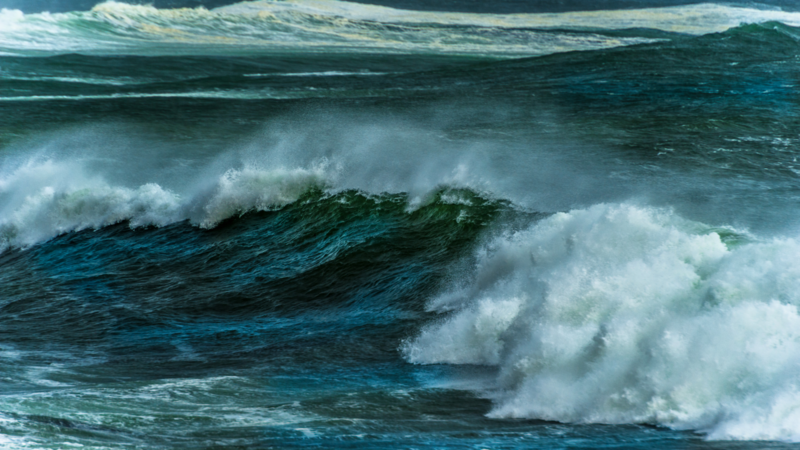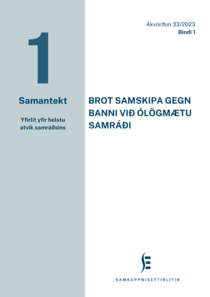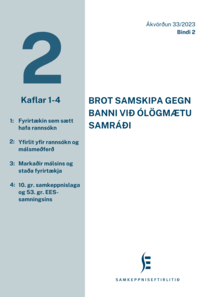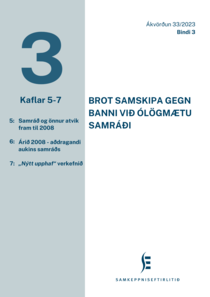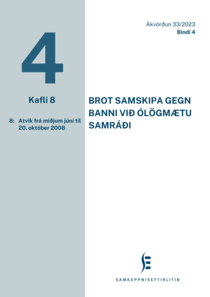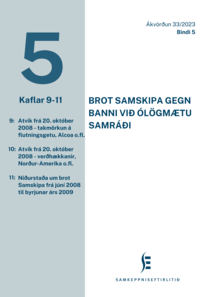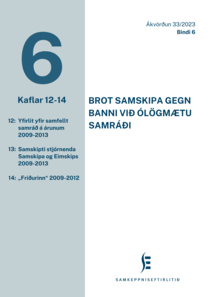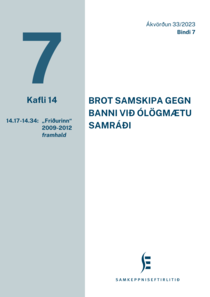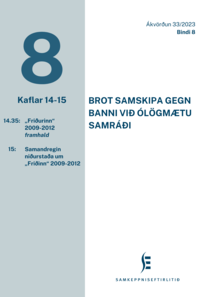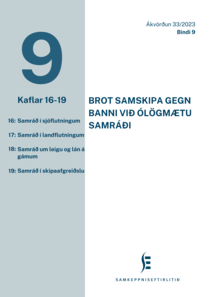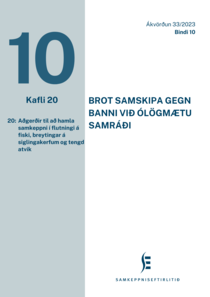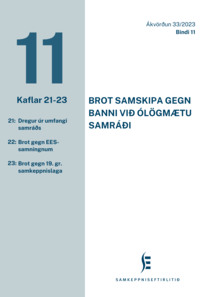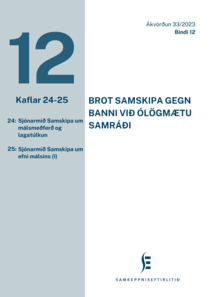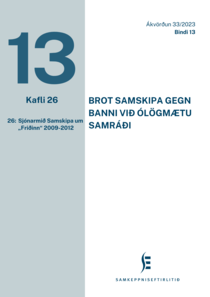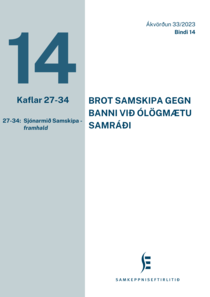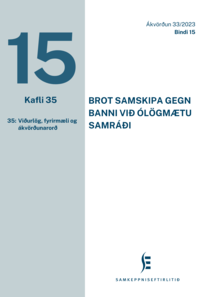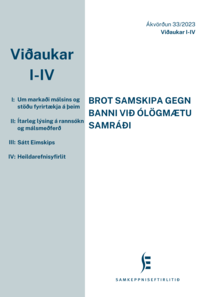Serious violation of the Icelandic Competition Act by Samskip
The Icelandic Competition Authority ("the ICA ") has by decision no. 33/2023 completed the investigation into Samskip's suspected Competition law violations. The ICA concludes that Samskip gravely violated the prohibition of Article 10 of the Icelandic Competition Act and Article 53.1 of the EEA Agreement with unlawful collusion with Eimskip.
It is also the ICA's conclusion that Samskip, during the case investigation, gravely violated Article 19 of the Icelandic Competition Act with incorrect, misleading, and insufficient information and data delivery.
An administrative fine for these violations has been imposed in the sum of ISK 4.2 bn. (ISK 4.200.000.000).
Furthermore, certain instructions are addressed to Samskip to prevent further violations and promote competition.
The investigation into Eimskip's violations ended in June 2021, with the company's settlement with the ICA. With the settlement, Eimskip admitted violation, paid an administrative fine of ISK 1.5 bn. and committed to take certain measures to prevent further violations and promote competition.
Regarding Samskip's violation, the decision states as follows:
"The collusion between Samskip and Eimskip as a whole was intended to enable the companies to significantly reduce competition and raise or maintain prices, e.g., by raising prices when contracts were being renewed, by raising prices and fees in price lists, by introducing new fees, by reducing discounts, etc. The joint dominant position of Eimskip and Samskip in the market, the communication between the companies' managers, and other factors in the companies' collusion created ideal conditions for the companies to succeed in the collusion and profit at the expense of customers and society as a whole."
Below is more extensive information on the case. At the bottom of the page, all 15 volumes of the decision are accessible, in Icelandic.
Summary
With this decision, the investigation into Samskip's suspected violations of the prohibition on unlawful collusion is completed. It is the conclusion of the Icelandic Competition Authority (“the Competition Authority” or “ICA”) that Samskip gravely violated the prohibition of Article 10 of the Icelandic Competition Act and Article 53.1 of the EEA Agreement with unlawful collusion for an uninterrupted period between 2008 and 2013 (the main investigation period), as well as certain violations that occurred before this period. It is also the ICA's conclusion that Samskip, during the investigation of the case, seriously violated Article 19 of the Icelandic Competition Act with incorrect, misleading and insufficient information and data delivery. An administrative fine for these violations has been imposed on Samskip hf. and Samskip Holding, in the sum of ISK 4.2 bn. (ISK 4.200.000.000).
The investigation initially involved Samskip and Eimskip. The investigation into Eimskip's violations ended in June 2021, with a settlement the company made with the ICA. With the settlement, Eimskip admits "to having been in contact and cooperated with Samskip in a way that constituted serious violations against Article 10 of the Competition Act and Article 53 of the EEA Agreement" (prohibition of unlawful collusion). With the settlement, Eimskip commits to take certain measures to prevent further violations and promote competition. The company also admits "having violated Article 19 of the Icelandic Competition Act by not having provided the necessary or correct information or failed to hand over data for the benefit of the Icelandic Competition Authority's investigation". Due to the above violations, Eimskip paid an administrative fine in the amount of ISK 1.5 bn. The amount of the fine reflects that an account was taken of the general rule that companies are subject to lower fines than otherwise if they come forward, acknowledge violations and undertakes to take action in order to prevent further violations.
When it became clear to Samskip that Eimskip was in settlement negotiations with the ICA, the company also requested settlement negotiations. After the negotiations had taken place in June and July 2021, it became clear that they would not produce a result that, in the opinion of the ICA, contained a satisfactory conclusion to the case, so the negotiations with Samskip were therefore discontinued.
As the settlement negotiations with Samskip ended without a result, in this decision it is concluded whether and how the company violated Icelandic competition law in the case under investigation. After the investigation of the case against Eimskip was completed, the ICA took Samskip's counter arguments into further consideration and gave the company further opportunities to express its views on certain issues under investigation in the case.
The investigation - Procedure
The investigation into the conduct of Samskip and Eimskip was initiated on the basis of tipoffs that the ICA received from, among others, customers of the companies. The tips were considered to provide ample evidence that key managers of the companies were in considerable contact with each other and that the companies were engaging in illegal collusion, which i.a. manifested in the fact that they did not compete for each other's important customers. The investigation revealed that the tipoffs were well-founded.
The investigation of the case began with dawn raids at Samskip and Eimskip in the fall of 2013, based on the court rulings of the Reykjavík District Court. On the same day and the following days, the ICA took oral reports from several of the companies' managers and recorded them. After the first processing of the data obtained during the dawn raids, the ICA then carried out another dawn raid at the companies offices in the beginning of summer 2014. At the same time, further requests for information and data were directed at the companies during the investigation.
From the outset, the investigation has been given priority by the ICA. The case is very extensive in nature and substance. Thus, the investigation of the case involved most aspects of the activities of two large companies that had operations in a number of countries. Under investigation were continuous and wide-ranging violations which lasted for many years. The scope of this investigation has no precedent in competition enforcement history in Iceland. It can be mentioned that the copied and seized data amounted to about 4 terabytes, which corresponds to tens of millions of documents and e-mails.
It had substantial impact on the investigation procedure that at the beginning of the investigation, both Samskip and Eimskip repeatedly gave incorrect, insufficient or misleading information about the relations and cooperation between the companies. This was first done during questioning of the respective managers in connection with the dawn raids at the companies offices. Furthermore, the companies did not provide important information or deliver data to the ICA‘s subsequent information requests. This conduct of the companies resulted in significant delays in the investigation of the case. With Eimskip's settlement with the ICA, the company admitted to having violated the information obligation of Article 19 of the Icelandic Competition Act and consequently paid administrative fines. In this decision, it is concluded that Samskip has violated Article 19 and administrative fines are imposed on the company as a result. It is stated that these violations of Samskip of Article 19. were extensive, serious and impeded substantially the effectiveness of the investigation.
During the investigation of the case, the Competition Authority published two Statements of Objection („SO") to the companies in which a detailed account of the preliminary findings of the investigation was given. The previous SO was published to the parties mid-year of 2018 and the companies were invited to express their comments and views. The second SO was published to the companies at the end of 2019.
The publication of two SO‘s served to give the companies more room to express their views and speed up the processing of the case. However, both companies decided not to take advantage of it. Upon publication of the first SO, Samskip decided to refuse to present their comments and views until the second SO was available. Eimskip initially announced that it intended to exercise its right to object due to the first SO and requested repeated deadlines for that purpose, but later changed its mind and decided not to comment until the second SO appeared.
The companies' points of view regarding the preliminary findings by the Competition Authority were therefore not received until well into 2020. Samskip's final comments on the SO‘s were not submitted until the end of August 2020, or over two years after the first SO was delivered and over eight months after the second was published. Both companies objected to ICA‘s preliminary findings and denied having violated Article 10 of the Icelandic Competition Act and Article 53 of the EEA Agreement.
Due to further investigation, i.a. as a result of the views expressed by Eimskip and Samskip, a letter was written to the companies at the end of November 2020, where they were given access to further data and given the opportunity to exercise their right of objection.
As mentioned above, Eimskip decided to reach a settlement with the Competition Authority in June 2021. In connection with that, Samskip also requested settlement negotiations, but they were unsuccessful. During further investigation, three letters were written to Samskip, i.e. in May and July 2022 and March 2023, in which the company was i.a. granted access to additional data and given the opportunity to exercise its right to object.
Investigation submitted to the Appeals Committee, the Courts and the Parliamentary Ombudsman
During the investigation of the case, the case has been referred seventeen times to the Competition Appeals Committee and the courts. In this way, the companies have sent seven appeals to the Appeals Committee, and issues related to the investigation have come before the Reykjavík District Court five times and have been brought before the Court of Appeal three times.
The disputed issues at the Appeals Committee and the courts can be broadly divided into three.
Firstly, Eimskip's and Samskip's access to search warrants and other data during the first two years of the investigation. These access issues were resolved by the Appeals Committee and the courts.
Secondly, the investigation was brought before the courts and the Appeals Committee in 2019 and 2020, mainly by Eimskip. Before the Appeals Committee, the company tried to receive certain data and information from the Competition Authority. The company then demanded twice before the District Court that the investigation of the case be discontinued and the case data destroyed. The company also believed that certain employees of the ICA were disqualified to handle the case. The company's claims were dismissed by the District Court in the first case, and the Court of Appeal confirmed that decision. The latter case was dropped by the company shortly before the company requested settlement negotiations.
Thirdly, Samskip has attempted to have certain provisions of Eimskip's settlement with the Competition Authority invalidated, but those provisions concern the end of the cooperation between the companies. The judgment of the District Court in that case has been appealed to the Court of Appeal, where the case is now waiting to be heard.
In 2015, Eimskip also filed a complaint with the Parliamentary Ombudsman regarding the case procedure and enforcement practices of the Competition Authority. The Ombudsman agreed to investigate the matter and requested information from the ICA. After receiving the Competition Authority's answers, the Ombudsman did not consider it necessary to act further on the complaint.
Chapter 2 of this decision contains an overview of the procedure of the case, and Annex II provides a detailed account of the individual aspects of the case procedure in chronological order.
Charges filed to the District Prosecutor‘s office
According to Article 42 of the Icelandic Competition Act, the Competition Authority shall assess, with regard to the gravity of the offense and with regard for administration of justice, whether that aspect of the case that concerns the criminal responsibility of an individual should be reported to the police, while the District Prosecutor‘s office investigates and prosecutes criminal cases based on violations of the Icelandic Competition Act.
The provisions of Article 42 also allow the mutual sharing of information between the Competition Authority and the police authorities. The Competition Authority is also authorized to be involved in measures taken by the police in relation to investigation of violations of the Icelandic Competition Act and the police is in the same way authorized to be involved in measures taken by the Competition Authority.
During the investigation of the case, the Competition Authority has three times filed charges to the District Prosecutor‘s office regarding certain employees of Samskip and Eimskip. This was done in 2014, 2016 and 2018. During the investigation of the case, the Competition Authority has also shared data and information with the District Prosecutor in accordance with the above-mentioned provisions and assisted the DP office during questionings. The District Prosecutor has also granted the Competition Authority access to data and reports that have been used in the investigation of the case and thus constitute part of the case file.
During the District Prosecutor's investigation, two managers of Samskip and two managers of Eimskip received legal status as defendant's. According to the information of the Competition Authority, these individuals still have legal status of defendants. The DP investigation is well underway but is has not been completed yet.
Violations – Unlawful Collusion
As stated here previously, it is the conclusion of the ICA that Samskip has seriously violated the prohibition of Article 10 of the Icelandic Competition Act and Article 53.1 of the EEA Agreement with unlawful collusion for an uninterrupted period between 2008 and 2013, as well as certain violations that occurred before this period. The breaches of Samskip include the following:
- Collusion regarding changes in shipping systems and to limit transport capacity.
- Collusion to implement market sharing of larger customers in maritime and land transport (avoid competing for each other's larger customers).
- Collusion on fees and discount terms in transport services and collusion to share of important price and business information.
- Collusion in land transport services involving market sharing on certain transport routes in Iceland.
- Collusion on maritime transport between Iceland and other countries.
- Collusion on stevedoring, mutual leasing or loan of containers.
Samskip's violations were serious, extensive and lasted for a long period of time, in markets where the parties to the collusion had a dominant position, where they had during the period a combined share of over 90% market share in maritime transport between Iceland and Europe, a combined share of 100% in maritime transport between Iceland and North America and a combined share of 75-80% in land transport overall. The companies have been among the largest companies in Iceland and their income from transport activities amounted to 2.6% of GDP (i.e. the value of all goods and services that are produced and offered each year).
Competition in transport is very important for the standard of living of the public and the competitiveness of the Icelandic economy. It was therefore of great economic importance that Eimskip and Samskip respected the ban on any kind of anti-competitive collusion between competitors. Otherwise, consumers, companies and the national economy as a whole could incur considerable economic losses.
Events leading up to increased collusion
The case data shows that in the first half of 2008, Samskip hf. in Iceland was considering how to respond to the worsening economic outlook and falling demand for imported goods. Two approaches were considered. On the one hand, increasing Samskip's competition with Eimskip, i.e. to reach out to Eimskip's customers and improve the utilization of ships. On the other, increasing Samskip's collusion with Eimskip. The latter was chosen.
Although the operation of Samskip hf. in Iceland was successful, Samskip Holding B.V. i.e. the Dutch parent company of Samskip Group, and its main owner, faced financial challenges in 2008. On the one hand due to the demands of Samskip Holding's main lender, Fortis Bank, and on the other hand due to challenges faced by the main owner of Samskip through investment companies as the second largest owner of Kaupthing Bank hf. on the eve of the economic collapse in Iceland.
In March 2008, the main owner of Samskip instructed the board members and key managers to take action to protect and strengthen Samskip's position in Iceland as a "Cash Cow" for the Samskip group ("...maximise the business and protect the Cash Cow which Iceland has been for the Group"). In this way, clear instructions were directed to, among others, CEO of Samskip in Iceland to ensure and increase the flow of funds from the operations in Iceland to Samskip Holding. The data show that the main owner of Samskip encouraged the CEO of Samskip to exert himself in the collusion with Eimskip, i.a. with the promise of a bonus payment.
At the same time, Eimskip was facing great financial difficulties, that were mainly caused by debts attributable to investments abroad. In May 2008, there was a change of CEO at Eimskip, but in an email from the CEO of Samskip to the main owner of Samskip, his assessment was that with the change, "the flexibility will be greater, and the hardness will be reduced". Furthermore, the CEO of Samskip said that he knows the new CEO of Eimskip well.
This and other relationships between the key managers of Samskip and Eimskip undoubtedly made it easier than otherwise for Samskip to approach Eimskip with the aim of increasing the illegal collusion between the companies. The communication and connections served to maintain the illegal collusion throughout the investigation period of this case.
Decision on extended collusion
The data of the case show that Samskip and Eimskip had at least since 2001, been active in an illegal collusion, but the most serious violations of this case began during the events leading up to the economic collapse in 2008. On June 6, 2008, the main owner of Samskip, the CEO of Samskip, the chairman of the board of Eimskip and the new CEO of Eimskip met in the offices of the investment company of the main owner of Samskip, Kjalar. At this meeting, Samskip and Eimskip decided to start a project that the companies named "New beginning". This project had the effect of distorting competition within the meaning of Article 10 of the Icelandic Competition Act and was illegal.
The purpose of the project was to evaluate the benefits to the companies of "extending" the illegal collusion of the companies that existed at the time. The collusion that was already in place in June 2008 involved, among other things, the following:
- Price collusion and market sharing between Samskip and Eimskip in the Netherlands, which was, inter alia, likely to have a detrimental effect on the export of seafood from Iceland.*
- Collusion in maritime transport between Iceland and other countries.
- Collusion in land transport in the northern part of Iceland.
- Collusion in ship handling services.
In the "New beginning" project,
Samskip and Eimskip decided to exchange sensitive information and evaluate
together the benefits of extending cooperation in key areas of their
operations. This included liner sailing schedules, maritime transport to and
from Iceland, market sharing, ship handling
in Iceland, land transport in Iceland, subsidiaries in Norway that handled the
export of frozen fish from i.a. Iceland and Norway, freight forwarding,
maritime transport between ports on the European continent (so-called
"short sea" transport) and cold storage operations in the
Netherlands.
During the period of the investigation, managers of the companies who were directly involved in the collusion had a number of meetings and conversations. Between June 2008 and January 2009, the respective managers had at least 19 meetings where they discussed the different tasks of the collusion project. In addition to that, data from the period shows that the respective managers had, in at least 18 cases, communication by phone or email during this same period.
Contemporary data also shows that during the period from 2009 to September 2013, managers and key employees of these two companies were in contact at least 160 times, at meetings, via phone calls, at golf tournaments, during travel, at dinner parties or in other ways. Emails between the companies are not included in the count. Chapter 13 of the decision outlines these communications, as well as their significance to the case.
Among the important evidence of Samskip's violations are internal documents from the companies, especially e-mails between colleagues, which shed light on the preparation of the collusion within each company individually. The data sheds light on the preparation and subject of meetings and other communications between the companies, as well as the preparation and implementation of the collusion in other respects. Thus, the data show i.a. in a detailed way how the companies coordinated their actions during the preparation and implementation in different areas of the collusion.
In the above-mentioned communications between Samskip and Eimskip during the collusion period, there were repeated discussions between managing directors and other directors, who, among other things, were responsible for liner sailing schedules, land transport schedules, pricing of transport services and other competitive aspects of the companies' services. The data show that the discussions between the companies extended to key areas of the companies' transport activities and to competition between them.
Second half of 2008: The foundations of the extended collusion laid
In the latter part of 2008 work was carried out on all aspects that fell under the aforementioned "New Beginning" project, including limitation of transport capacity and increased cooperation in maritime transport. Deteriorating economic conditions resulted in a decline in imports to Iceland. It was clear that unused transport capacity was costly to the companies and created an incentive for increased price-competition in order to attract increased transport volume. At the same time, Samskip's management projected that transport with the same ships from Iceland would increase, not least due to Samskip's increased transport of aluminum for Alcoa Fjarðarál. Measures were taken i.a. to limit import carrying capacity, but at the same time to have sufficient export carrying capacity to maximize revenue from important exporters such as Alcoa and the fishing companies.
An important milestone in the collusion between Samskip and Eimskip was reached in the late summer and autumn of 2008, with changes in liner sailing schedules and limitation of transport capacity. At the same time, the companies consulted on various types of support measures in order for the collusion as a whole to succeed. In connection with Samskip's decision at the end of October 2008 to reduce the number of ships in sailings to and from Iceland from four to three, Eimskip e.g. undertook to transport part of the aluminum that Samskip would have otherwise transported for Alcoa. On the basis of the collusion, Samskip was able to reduce services to Aloca on the one hand and increase prices by 131% to that same important customer. Within Eimskip, there was great satisfaction with the transport business the company acquired on the basis of the collusion and described this, among other things, as "ecstasy". Eimskip also undertook to transport signficant volume from the UK to Iceland for Samskip. At the same time, the key managers of the companies were repeatedly in illicit contact with one another. At the same time, both companies were preparing significant price increases and were in contact with each other about issues relating to their price decisions.
Official and other data show that the great economic difficulties that hit the world in the fall of 2008 had the effect, both in Iceland and in neighboring countries, that the demand for the services of transport companies decreased significantly, and that important buyers of such services demanded better prices as their activities became more difficult. This situation led to fierce price competition on foreign transport markets and, for example, it was stated in Morgunbladid news on October 30, 2008 that "freight rates have never decreased so much".
As a result of the collusion between Samskip and Eimskip in Iceland, the companies were able to repeatedly raise prices in the latter part of 2008. As a sign of this, Samskip's CEO declared in October 2008 that the company had achieved "massive increases". The reaction of one of Eimskip's customers to the company's price increase in November 2008 was: "Are you crazy? Who accepts an 80% increase?" Contemporary data confirms numerous complaints from the companies' customers objecting to price increases, e.g. citing a significant drop in oil prices and an unprecedented drop in shipping prices in shipping markets abroad. Because of the collusion, Eimskip and Samskip, on the other hand, did not have to fear competition from each other and were able to ignore complaints and protests.
This part of the investigation is discussed in detail in chapters 8-11 of this decision.
„The Peace“: 2009-2012
As outlined above, Samskip and Eimskip had taken important measures in the second half of 2008 in order to ensure that their collusion would be successful in the difficult economic circumstances in Iceland at the time.
At the time, a relatively small group of large customers was by far the most important for the operation of both Samskip and Eimskip. At a certain point in time, 38 out of a total of 1800 customers accounted for 66% of Samskip's revenue from transport to Iceland. In such circumstances, there is an obvious risk that the collusion of competitors to reduce transport capacity will not be sufficient to raise prices or prevent falls in prices. Thus, an important customer of either company can seek offers for its entire transport purchases, and the other company may believe that it will benefit more from winning the customer over instead of honouring the collusive agreement.
Samskip and Eimskip prevented this risk through illegal market sharing. Accordingly, Eimskip has admitted that after June 6, 2008, it colluded "with Samskip about market sharing of larger customers in maritime and land transport." This involved that the companies would not compete for and try to win over such customers from each other.
The aforementioned admission by Eimskip is fully consistent with contemporary data, as during most of the period in question important customers did not move from Samskip to Eimskip and vice versa. It made no difference although the customers repeatedly requested offers for their business, i.a. by means of tender arrangement or tried in other ways to get better terms and protect themselves from price increases by Samskip and Eimskip.
The collusion between Samskip and Eimskip as a whole was intended to enable the companies to significantly reduce competition and raise or maintain prices, e.g. by raising prices when contracts were being renewed, by raising prices and fees in price lists, by introducing new fees, by reducing discounts, etc. The joint dominant position of Eimskip and Samskip in the market, the communication between the companies' managers and other factors in the companies' collusion created ideal conditions for the companies to succeed in the collusion and profit at the expense of customers and society as a whole.
An example of the above is Ölgerðin's tender in 2009 Ölgerðin was one of Eimskip's most important customers. At the beginning of 2009, Ölgerðin was extremely unhappy with the large increases in prices for Eimskip's ocean freight services, which were inconsistent with the existing contract between the two companies. Furthermore, Ölgerðin considered the prices for Eimskip's ground transportation services to be "ridiculous". Within Eimskip, on the other hand, nothing was done about these complaints, as Eimskip did not have to fear competition for Ölgerðin‘s business due to the collusion with Samskip. Instead, Eimskip's managers shared Ölgerðin's complaints with each other for "fun".
As a result, Ölgerðin decided to tender all of its transport purchases. Shortly before the opening of the tender, five of Samskip's senior managers held a "contest" among themselves, in which they guessed Eimskip's tender price. The guesses of all the managers were based on the assumption that Eimskip would offer a lower price than Samskip in each area of the tender. The thrill/contest between Samskip's managers was about which of them would guess Eimskip's correct offer price, and not whether Samskip would win the business of Ölgerðin.
The case data thus shows that Samskip's offer to Ölgerðin was a pseudo offer. The collusion between Samskip and Eimskip enabled Eimskip to keep the business and increase the price to this customer. At a meeting in Eimskip‘s headquarters, there was great satisfaction with the result, and a manager at the company emphasised this to his subordinates: "Have made it clear that we should generally not lower prices. Instead we need to raise prices [...] Shipping volume could be more these days".
The market situation that resulted from the collusion is described in contemporary documents of the companies as "peace" (or "calmness" in the market). Instead of effective competition for important customers, "peace" prevailed and mutual certainty remained about the competitor's response. On that basis, the companies focused on keeping prices high or increasing them.
One manifestation of this was that both Samskip and Eimskip assumed in their financial plannings that they would be able to repeatedly raise prices and at the same time keep their most important customers.
At the beginning of the investigative period, the economic environment abroad was very weak and the business situation was difficult in the transport sector there. Samskip Holding operated transport services in various European countries other than Iceland. In the minutes of the company's board meetings, it is stated that there has been a sharp decline in demand in foreign transport markets. Contemporary data show that the company's customers in the foreign transport markets where the group operated, pushed for price cuts. It is also clear that the economic downturn lead to falls in the prices of important inputs, such as oil and ship rentals, went down, which in turn created room for price cuts. In the minutes of Samskip Holding's meetings, it is stated that this has led to intense and even desperate competition in the foreign transport markets. This had a significant impact on the operating performance of the company's subsidiaries. In the same minutes of Samskip Holding, a completely different situation was described in respect of Samskip hf. in Iceland.
In these minutes of Samskip Holding's meeting, it is stated that they are extremely satisfied with the performance of Samskip hf. in Iceland. Examples of this are:
· In the minutes of a meeting from April 2009, it is stated that the EBITDA of the sister companies of Samskip hf. are significantly below plan, but the group as a whole was on plan. The reason for this is attributed to the excellent results of the Icelandic operations:„This is mainly due to to extremely good results from Iceland“.
· In the minutes of a meeting from May 2009, it is stated that the EBITDA of the group as a whole exceeds the plan, and the reason is again stated as follows: „continued good results from Iceland.“
· The CEO of Samskip hf. declared that 2010 had been a "great year" and that he and key executives deserved bonuses for "outstanding results". Furthermore, he believed that the year 2011 was "a very good year".
In this regard, it should be noted that despite the fact that Samskip's turnover in Iceland in 2009 was only about 24% of the group's total turnover, the operations in Iceland generated about 82% of the group's EBITDA. This shows the success of Samskip hf. in Iceland as a "Cash Cow" for the group, just as the main owner had planned and instructed on the eve of the extended collusion in 2008.
An example of a manifestation of this is an e-mail that the manager of the international division at Samskip sent to i.a. the CEO of Samskip on December 15, 2010. These key executives were in Rotterdam at the time to present, at a meeting of the board of directors of Samskip Holding, the financial results of the first ten months of 2010 and the plan of Samskip hf. in Iceland for 2011. In the email merely this was stated:
"The cash cow has arrived"
Attached to the manager's e-mail was a picture of a dairy cow and it was clear that it was referring to Samskip hf. in Iceland. This is covered in more detail in the decision, chapter 14.33.15, paragraphs 7236-7237.
2013: The extent of the collusion reduced
In 2013, Samskip reduced its collusion with Eimskip. At the time, the economic recovery in Iceland created an incentive for the companies to increase their supply of transport volume in their shipping systems and withdraw from the collusion they had started following the economic collapse in 2008. At that time, Alcoa also withdrew its export business from Samskip and Eimskip and as a result extensive transport volume was freed up in the shipping systems of the companies, in particular Samskip.
-----------------------------------------------------------------------------------------------------------------
* Samskip and Eimskip operated cold storage facilities in the Netherlands which, among other things, were used in connection with transport to and from Iceland. After a dawn raid at Samskip, Eimskip and two other companies, the Dutch Competition Authority imposed a fine on the companies due to illegal collusion on the cold storage market in the Netherlands in the years 2006-2009. Eimskip decided to accept the Dutch Competition Authority's decision, but Samskip did not. In July 2022, the District Court of Rotterdam confirmed the conclusion of the Dutch Competition Authority regarding Samskip's participation in theillegal collusion and that the fine imposed on the company was reasonable in view of the seriousness of its violations. In the press release of the Dutch Competition authority, i.a. this was said about the offenses: „Between 2006 and 2009, the companies that have been fined distorted competition in various ways. Anticompetitive arrangements have been discovered in various emails. Competition-sensitive information was frequently exchanged. For example, the managers informed each other about the price for food storage. They also told each other the current utilization rates of their storage facilities, and thus whether or not they were looking for jobs. Sometimes they made arrangements about who would get which customer or about what price increase would be passed on. Also, arrangements were made about bids to potential clients, which meant that it was clear in advance who would get the job.“
Breach of the EEA Agreement
According to Article 21 of the Icelandic Competition Act, the Competition Authority shall apply Article 53 of the EEA agreement in Iceland. Article 53 of the EEA Agreement prohibits anti-competitive collusion between companies and their associations that may affect trade between member states of the EEA Agreement.
When assessing whether a conduct has such an effect, it is based on the guidelines of the EFTA Surveillance Authority and legal practice in other respects. It is the conclusion of the Competition Authority that the violations in this case were intended to affect trade between EEA countries within the meaning of Article 53 of the agreement.
The Substantive provisions of Article 53 of the EEA Agreement are fully comparable to the provisions of Articles 10 and 12 of the Icelandic Competition Act, as the Act is in this respect based upon EEA/EU competition law. In this decision, detailed arguments are presented that show that Samskip has gravely violated Article 10 of the Competition Act. Based on the same arguments, it is the conclusion of the Competition Authority that Samskip has violated Article 53 of the EEA Agreement. It follows that the Competition Authority's assessment of whether Samskip's conduct violated Article 10 of the Competition Act also extends to Article 53 of the EEA Agreement.
False, misleading and incomplete disclosure of information and data delivery
It is the conclusion of the Competition Authority that, during the investigation of this case, Samskip is guilty of false, misleading and incomplete delivery of information and data. By doing so, the company violated Article 19 of the Competition Act, but the provision grants the Competition Authority the power to obtain data during the investigation of individual cases. Violating the obligation to provide information and deliver data, cf. Article 37.1.i of the Competition Act, is subject to administrative fines. In Eimskip's settlement with the Competition Authority, the company admits to a violation of Article 19 and pays fines.
Samskip's violations in this regard are that during oral disclosure, in connection with the dawn raids at the company's premises by the Competition Authority on 10 and 17 September 2013, the company repeatedly provided false, insufficient or misleading information about relations and cooperation with Eimskip. Samskip's violations in this regard also involve not providing information or handing over data in accordance with requests for information directed at the company during the investigation.
These violations were extensive and serious. They complicated and delayed the investigation of the case, as the Competition Authority was misled and important information was withheld from the investigation at its early stages.
Violations of Article 19 are further discussed in chapter 23 of the decision.
Fines
According to Article 37 of the Competition Act, the Competition Authority imposes administrative fines on companies or associations of companies that inter alia violate the prohibition of unlawful collusion according to Article 10 of the Competition Act or Article 53 of the EEA Agreement. The same applies to violations of the obligation to provide information and deliver data according to Article 19 of the same Act.
The decisions of the competition authority that concern violations of the Competition Act and the corresponding fines for them are inter alia intended to have a deterrent effect, to discourage companies from continuing to violate or repeat violations and thuscreate the conditions for effective competition, which in the short or long term is beneficial to the public.
It is the conclusion of the investigation that Samskip hf., Jónar and Samskip Holding are one and the same company (one economic unit) in the meanings of the Competition Act. In accordance with that, the Competition Authority exercises its powers to direct the fine at the parent company Samskip Holding, as well as Samskip hf. That arrangement is best suited to have a sufficient deterrent effect.
When deciding the administrative fines, the Competition Authority takes account of, among other things, the nature and extent of Samskip's violations, how long they lasted, the size and turnover of the company, the combined share of companies in the market or markets affected by the violations, the size and importance of the market affected by the violations, the company's part in initiating the violations and whether the violations were implemented.
Article 37 of the Competition Act also provides for a certain maximum fine, i.e. up to 10% of the total turnover of the last calendar year of the company participating in anti-competitive practices. The same maximum applies in EEA/EU law. The total turnover of Samskip Holding in the year 2022 was 137 bn. ISK.
In the decision it is also assessed what the fines in the case might be if the rules of the EFTA Surveillance Authority had been applied. That discussion is presented for comparison since the ESA's methodology for determining fines has not been directly incorporated into Icelandic law.
The above is described in detail in sections 35.1 – 35.2 of the decision. With reference to that analysis, it is the conclusion of the Competition Authority that a reasonable fine for Samskip's violations of Article 10 of the Competition Act and Article 53.1 of the EEA Agreement is ISK 4 bn. (ISK 4.000.000.000).
When assessing Samskip's violations of Article 19 of the Competition Act, the Competition Authority takes account of, i.a., that the efficient enforcement of competition law is not least based on compliance of the companies subject to investigation with instructions to provide information and data. In this case, it is clear that Samskip's violation of the obligation to provide information pursuant to Article 19 of the Act are extensive and serious. They undermined the efficiency of the investigation of the case and delayed it.
With reference to this, it is the conclusion of the Competition Authority that a reasonable fine for violating Article 19 of the Competition Act is ISK 200 m. (ISK 200.000.000). This is described in more detail in section 35.3.
Decision and Actions
With this decision, cf. chapter 35.5, as previously stated, it is concluded that Samskip has violated the prohibition of Article 10 of the Competition Act and Article 53 of the EEA Agreement on unlawful collusion. It is also concluded that the company has violated Article 19 of the Competition Act with incorrect, misleading and insufficient information and data delivery. In the decision, it is stipulated that Samskip Holding BV and Samskip hf. shall pay in solidum an administrative fine in the amount of ISK 4.2 bn. (ISK 4.200.000.000). The administrative fine shall be paid to the state treasury within one month of this decision.
In the decision, the following instructions are addressed to Samskip.
- Samskip reviews all contracts with other companies in transport services in order to ensure that they are in accordance with Competition law.
- All commercial cooperation with Eimskip and related companies shall be terminated, if it exists. The same applies to cooperation with companies that Eimskip cooperates with. This does not apply if Samskip can demonstrate to the Competition Authority that the cooperation in question is such that there is no risk of distortion of competition between Eimskip and Samskip.
- It must be ensured that all managers and employees are informed about the requirements of the Competition Act for the company's activities. In that regard, there must be a Competition compliance program, work procedures that ensure its follow-up, and organized and regular education.
Violations of the instructions are subject to administrative fines according to IX. section of the Competition Act.
Presentation of the decision
The investigation into Samskip and Eimskip violations has been very extensive. It has involved powerful international companies, concerns important markets and covers a long period. This is the most comprehensive investigation by the ICA that has ever been carried out in Iceland.
Therefore, the decision in this case is very extensive. It is presented in 15 volumes and structured as follows (volumes in Icelandic):
